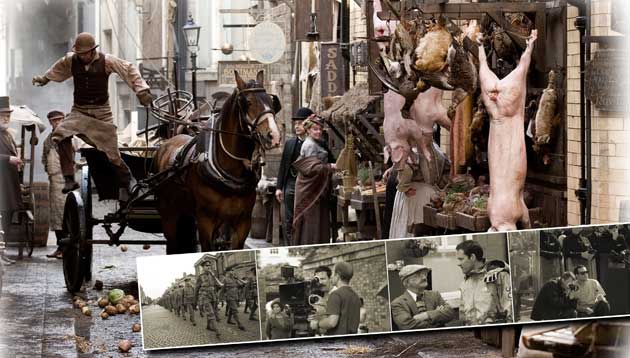A day in the loaf: Behind the scenes at the latest Hovis ad
Hovis has a lot to live up to with its new television ad - its 1973 commercial was voted the nation's favourite. Tim Walker met the people behind the latest advert

Thirteen-year-old Brian Mackie has a glint in his eye as, cradling a little brown loaf, he steps from a busy 19th-century market into the middle of an explosive suffragette protest. Another duck and a dive and he's marching alongside a parade of soldiers off to the battlefields of the Great War. He clambers over a wall, scuttles down an alley and finds himself in the rubble-strewn aftermath of the Blitz. Not to worry, though – the Coronation is just around the corner. In 122 seconds this cheeky young chap makes his way through 122 years of British history, and all in time to make it home for tea.
On Friday evening, sandwiched between two slices of Coronation Street (at 8.45pm on ITV1), you can gorge on this new advertisement for that enduring British brand, Hovis. Made for the relaunch of the iconic little brown loaf (first sold 122 years ago) it was conceived by creatives Gavin Torrance and Danny Hunt of Miles Calcraft Briginshaw Duffy (MCBD), and brought to life by up-and-coming director Ringan Ledwidge.
Hovis has a rich advertising heritage, the best known example being the "boy on the bike" commercial made by Ridley Scott in 1973, which was recently voted the best-loved British ad of all time.
Despite the star of both commercials being a young boy delivering bread, 37-year-old Ledwidge (the name's Irish, by the way) says he hadn't paid much attention to Scott's famous ad. "It has legendary status in the advertising industry, but I only had vague memories of it," he admits. "I didn't really use it as a reference point, but I did know that the boy and the idea of home were both important things that Hovis like to associate with their brand."
The new commercial was shot in Liverpool over six days this summer, which, considering it features a large street-scene from every decade of the last 120 years, is quite some schedule. For Ledwidge, who has previously directed high-profile ads for the likes of Lynx, Vodafone, Adidas and Orange – and last year released his first feature film, Gone – it was, nonetheless, a formidable undertaking.
"It was the most complex and largest-scale commercial, at least in terms of the sheer number of extras, that I've ever done," he says. "We did the suffragettes scene and the World War One scene the same day. I was lucky to be in the position of simply saying what I wanted and having it done. The first assistant director and the wardrobe, hair and make-up departments did brilliantly to turn round 400-odd people in a day."
The team's attention to detail was so rigorous that different extras were hired for each scene, based on the historically relevant placement of their facial features.
Unlike Scott's 1973 ad, which famously featured the theme from Dvorak's New World symphony, the creatives decided to commission a new piece from Manchester act Working for a Nuclear Free City. Their string-laden indie soundtrack helps tug at the heartstrings a little harder, and keeps the momentum through so many changes in time and tone.
The brief was only given to MCBD in April, a quick turnaround for such an ambitious campaign, but, says Torrance: "The biggest part of any commercial is coming up with the initial idea. Once we had that approved, we could look through British history and pick anything that we thought would be brilliant to put in the ad."
Ledwidge is following Scott into feature films, where many others have gone before – among them Alan Parker, Adrian Lyne, David Fincher and Spike Jonze.
But, nowadays, features are being funded by advertisers and, indeed, becoming subtle (and not-so-subtle) advertisements themselves. Director Shane Meadows's well-reviewed new film, Somers Town, for instance, began as a short to promote Eurostar. How does Ledwidge feel about the possibility of brands remaining his patrons, even after he moves into feature-film-making?
"There can be awful product-placement in films, if you're just having a Coke can dangled in front of you all the time," he says. "But I think with Somers Town the balance felt right. If it's done the right way, it gives people an opportunity to make films, and that can't be a bad thing."
Join our commenting forum
Join thought-provoking conversations, follow other Independent readers and see their replies
Comments